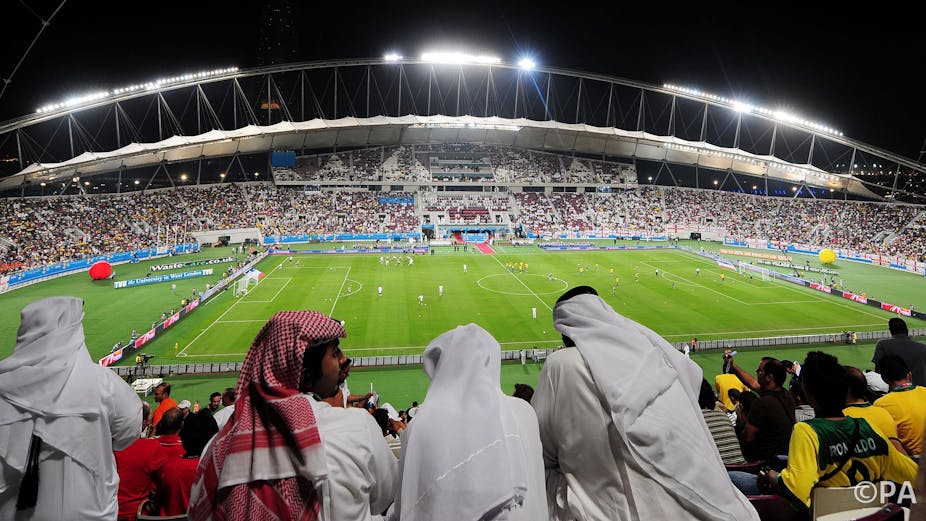Three years on from winning the competition to host the World Cup, and still more than eight years out from actually hosting the tournament, Qatar 2022 is everywhere. By the time it happens it will have occupied more discussions, analyses and columns than possibly any other sporting event in history.
There remains deep scepticism about the initial process through which Qatar was awarded the tournament. Critics point to a lack of footballing culture and continue to say the country is too small and too hot to be a host. Many have called for the Qatari World Cup to be switched to the winter months.
FIFA has chosen not to address the issue until two years from now, when a decision will be made about possible rescheduling. It’s a tough one, with various stakeholders in disagreement and threats of litigation already emerging.
Facing criticisms
But Qatar has other matters to deal with first. Amnesty International and Human Rights Watch have contributed to widespread criticism of the way in which its immigrant construction workers are being treated. People have questioned the country’s stance on homosexuality, while the story of French footballer Zahir Belounis – denied an exit visa and not paid for two years after a dispute with his club – has raised questions about labour laws.
Add to this the cynicism about Qatar’s motives in acquiring top French football club Paris Saint Germain and sponsoring Barcelona’s shirts, and one is left with the impression that here is a country overwhelmed by the attention of a world that is deeply uncomfortable with one of its leading sporting mega-events being held there.
Qatari officials have inevitably and invariably sought to rebuff the allegations and the adverse publicity heading their way. Indeed, given the less conservative nature of Qatar compared to several of its near neighbours, some locals are bemused by the vociferous nature of criticisms levelled against the country.
In other cases, Qatari officials have effectively held-up their hands, acknowledged the problems that exist and stressed that Qatar is learning and will try to put things right. This kind of response is interesting, not least because it betrays something of what is really at the heart of Qatar’s hosting of the World Cup and its more general sporting aspirations.
Vanity projects
Qatar might be small, but it is rich in oil and gas. Such mineral holdings makes it the richest country in the world, with income per head averaging US$102,000.
This wealth has enabled Qatar to become one of the world’s most conspicuous consumers, spending heavily on supposed vanity projects, including sport. However, the Qataris themselves take a rather more considered and strategic view of both their new found wealth and their investment in sport.
This is embodied in the government’s 2030 National Vision, which details how Qatar intends to use its wealth. The document is tacit acknowledgement that at some stage in the future the country’s gas and oil reserves will dry-up, hence the need to build a sustainable future while the times are good. As a result, Qatar is seeking to move its economy from a natural resource-based one to a knowledge-based one.
Sporting investment is not an adornment; it is seen as just one component of Qatar’s strategy for national development, no different from changes to labour laws, or a new transport network.
Sporting vision
This throws down a gauntlet to many advocates across the world of the “sport for good” school of thought. Qatar may not be communicating its message as well as it should (certainly at a global level), but the country’s rulers appear to be signed-up to an agenda that places the beneficial aspects of sport at its heart.
Indeed, the National Vision accentuates the importance of sport in much broader, deeper ways than most European governments (many of which are being put to shame by comparison).
Sport is helping to address some of the serious healthcare problems Qatar faces such as obesity among young people. It is a focal point for native and immigrant workers to socialise with one another, helping foster social cohesion among a rapidly growing population. When you add in the obvious infrastructure upgrades and the development of industries needed to serve an estimated 60 global sporting events by 2022, wider benefits are obvious.
Blank sheet
If you were to give experts in sports policy a blank sheet of paper and ask them to design a strategy “from scratch”, then what they would fill the paper with would not be too dissimilar to what we now see in Qatar. Yet for all its visionary strengths, Qatar seems to be facing a classic strategic challenge of how to make the next step into effective implementation and management.
In the coming eight years Qatar needs a decent PR strategy to stand alongside its 2030 National Vision. More fundamentally, it must get to grips with the disconnect between vision and planning, and implementation and management.
If the country is genuinely concerned about, for example, conditions for immigrant workers, then it must do something about the matter. Unless Qatar does this, repeating a “sport for change” mantra will sound increasingly hollow and continue to attract further international criticism.

